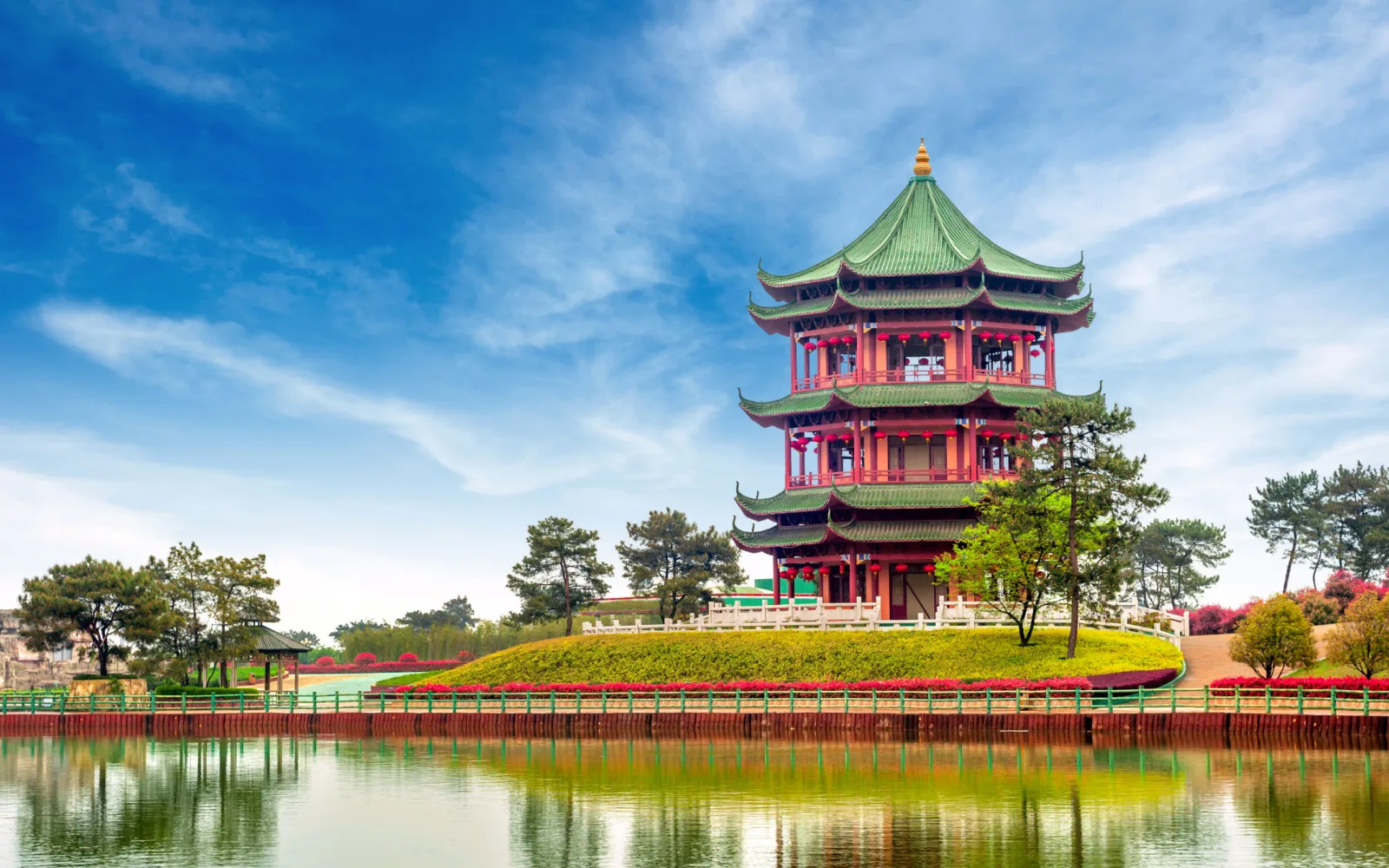China is on many bucket lists for a reason. The country has over 50 UNESCO heritage sites, two wonders of the world, and so much more to discover.
History lovers will be astounded by all there is to see in China, from the Forbidden City of Beijing and the Great Wall of China to the north to the ancient Terracotta Army.
Of course, one of the best things to do in China is to eat and explore the many regional cuisines. It’s a wonderful place to visit, but for some visitors, it can be overwhelming due to the sheer number of visitors and cultural differences.
But while the country is rich in history and culture, is China safe to visit? Here’s our expert take.
Is China Safe to Visit in 2025?
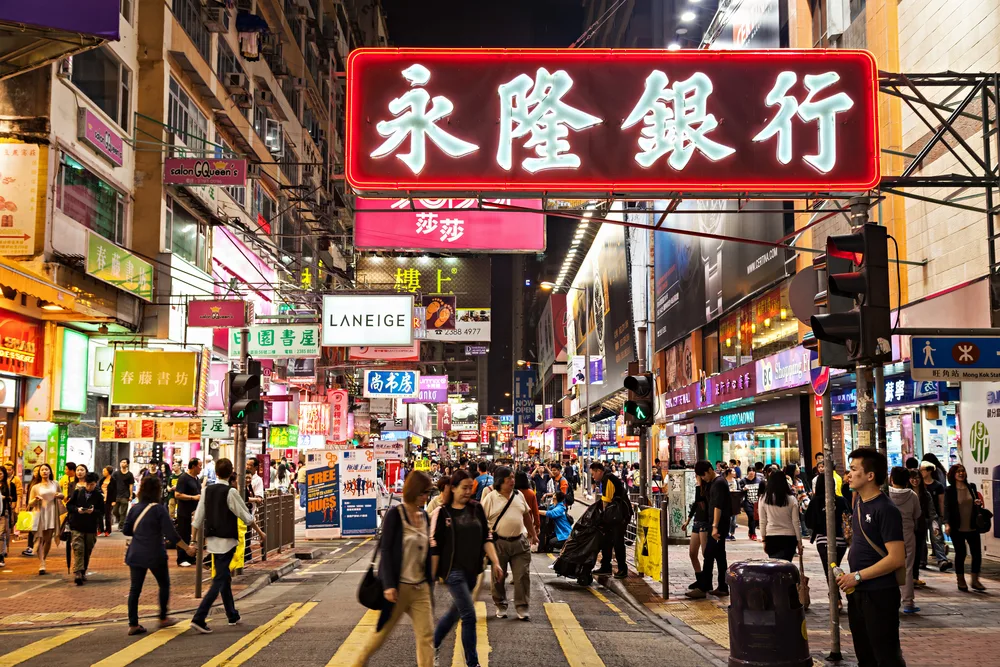
HONG KONG – MARCH 19: Neon lights on Mongkok street on March, 19, 2013. Mongkok street is a very popular shopping place in Hong Kong/Saiko3p/Shutterstock
Yes. For the most part, China is safe to travel to, as long as you don’t run afoul of the government. Crime rates are generally low, and most crimes that foreigners encounter are petty in nature.
You will have to be careful of the political situation as well. The level of caution in travel advisories differs depending on which country is issuing it.
The United States has China under a Level 3 travel advisory, telling its citizens to avoid all non-essential travel to the country.
Other countries, such as Canada, have lower advisories, only putting China under a Level 2 travel advisory, which just tells citizens to exercise increased caution.
A lot of times, the severity of a country’s travel advisory reflects more on the political situation and diplomatic relations between that country and China than on the security situation on the ground in China.
For example, relations between the United States and China are currently very tense, so it makes sense that the U.S. government would be more wary about its citizens, especially high-profile citizens such as diplomats, traveling to China than citizens from a country with a more neutral relationship, such as New Zealand.
The political situation in China is definitely something you should be aware of before you visit. The Chinese government is a one-party state where the central government has a lot of power.
There are more restrictions on freedom than you’re probably used to in your home country — for example, China has the Great Firewall, which restricts Internet access to many sites for its citizens.
Although the likelihood of politics affecting you as a tourist is low, the possibility is still there. For example, the New Zealand government warns in its travel advisory that there have been situations of foreign citizens receiving exit bans without knowing why.
Avoid doing anything that might put you on the radar of the government, such as criticizing the government, making critical posts online, or attending a demonstration.
You also don’t want to put any locals you befriend during your travels at risk. Besides the political situation, visitors to China are also concerned about crime. For such a big country with massive cities, the crime rate in China is actually low, but it still occurs.
Be careful about common crimes such as:
- Pickpocketing
- Bag snatching
- Scams
- Banditry
- Sexual harassment
- Sexual assault
Finally, it’s worth mentioning natural disasters that you should watch out for in China.
The Singaporean government warns citizens to be careful when traveling to places along the South and East coasts of China during typhoon season, which occurs between May and November. Some parts of China are also in earthquake zones.
Crime in China
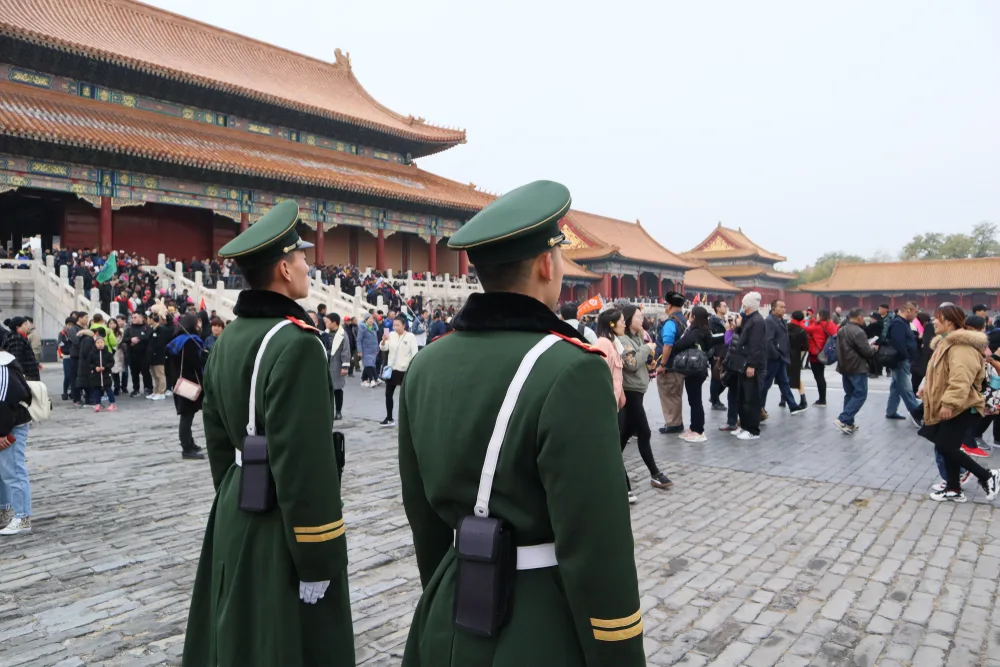
Beijing, China – November 17 2019: Chinese police called GongAn standing at forbidden city. Rear view of chinese police man guarding/Geewon Jung/Shutterstock
When visiting a new place, most visitors are primarily concerned with crime. However, that is unlikely to be a concern in China. The crime rate in China is stunningly low, especially when considering how populous the country is.
Violent crime rates in China are very low. According to the World Bank, the homicide rate in China was only one incident per 100,000 people in 2018.
Since then, the homicide rate has dropped even lower. The most common crimes in China are non-violent in nature, such as theft and fraud.
Some people are skeptical that the crime rate in China is really this low, pointing out that the notoriously tight-lipped Chinese government is not known for openly sharing statistics about its country, especially when they might paint the government in a bad light.
However, the official low crime statistics are backed up by the public perception of locals and ex-pats. According to Numbeo, which gathers data for public surveys, China scores a 20.21 on the crime index, which is a low value.
People report low concern levels about all types of crime, from petty theft to assault. China’s crime levels were fairly low to begin with, and the prognosis is even more optimistic.
The violent crime rate decreased to its lowest point in 20 years, with only 3.9% of all offenses in 2022 classified as violent. The most common crime now is drunk driving.
There are a few caveats to the low crime rate. Many of the most common crimes in China are the types that are difficult to prosecute, such as white-collar crime and fraud, or that victims may not feel safe reporting, such as sexual assault.
Plus, the crime rate doesn’t take into account crimes committed by the state, such as police violence. Despite those caveats, you should feel very safe when you are in China.
The crime rate is low, making it unlikely for you to be the victim of a crime.
Cities have a very high police presence, making it difficult for criminals to get away with anything unnoticed. Plus, criminals usually avoid foreigners because they don’t want to deal with the extra police attention.
Pickpocketing
Foreigners are unlikely to be victims of crime in China except for one category of crime where they are targeted more than locals — pickpocketing.
Individuals or gangs that make a dishonest living by pickpocketing know that foreigners make likely targets because they are more distracted as they move around and are more likely to have valuables.
If you read travel forums and blogs, they usually have advice about where in China you are most likely to encounter pickpockets. Be careful around popular tourist attractions such as the Forbidden City.
Public transportation is another place where pickpockets are likely to strike, especially train stations.
The general advice is to be careful in crowds, but since China’s cities are so big, crowds are pretty much inevitable, as is someone brushing up against you (cultural regulations about personal space are different in China).
When you’re venturing out in the city, make sure that your valuables are secure. Invest in a money belt or a secure bag with a cross-body strap and a zipper. Besides pickpocketing, bag snatching is common.
Never leave your bag unattended, even in locations that feel safe such as a Starbucks or hotel lobbies — these are technically still public places. When sitting down to eat or drink, keep your bag on your lap or secured on your shoulder, not hanging off the back of your chair.
When paying at a counter, maintain firm control of your bag at all times. Scams targeting tourists are also very common in China.
The Canadian government warns about common scams targeting foreigners, especially in Beijing’s Tiananmen Square and touristy areas of Shanghai such as The Bund.
Scammers will invite victims into nearby establishments for “authentic” experiences such as tea tasting and massages, then hit them with exorbitant bills in the thousands of dollars.
Never go into a business with someone you just met or agree to a service without checking out the price first. Phone scams are also common, with people posing as the police.
Never send money to people who call you over the phone or click on any links that you receive via SMS. Invest in additional security for your phone, as cybercrimes are common in China.
Sexual Assault
Although violent crimes against foreigners are rare, sexual assault unfortunately still happens. The Australian government warns any of its citizens looking to visit China that spikings are common.
Criminals will drug foreigners, then rob them or sexually assault female tourists. Never accept food, drink, or gum from strangers, as you don’t know what it might contain.
Be careful on public transportation, as that is another hot spot for harassment or assault.
On overnight trains, make sure that your compartment is locked. The UK government also warns tourists not to get into unmarked taxis as there have been cases of assault against passengers. Only travel with official taxis.
Avoiding Bad Areas
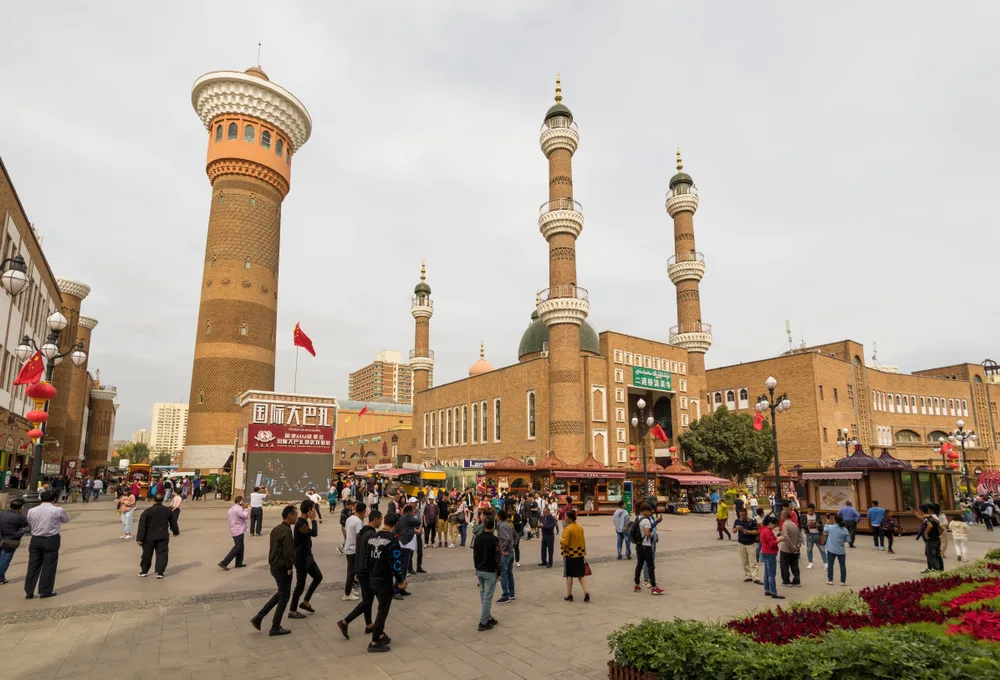
Sirio Carnevalino/Shutterstock
Certain regions of China have extra dangers attached to them. The Xinjiang Uyghur Autonomous Region is not safe to travel to right now due to political unrest and repression against the local ethnic minority Uyghur population.
Be careful when traveling to the region and especially avoid it if you have family ties as foreign citizens have been detained. The situation in Tibet is similar.
The Tibet Autonomous Region is another region with an ethnic minority that has had simmering political tension for decades. You can only travel there through an authorized tour with permission from the Chinese government.
Some of China’s remote border regions, for example, near the land borders with Laos, Kazakhstan, Vietnam, Russia, and Mongolia, are high in crime. Armed groups are involved in banditry and smuggling. Avoid traveling in remote areas near the borders.
Things to Consider
Here are some other things to consider while visiting China:
- Air pollution levels in China’s major cities can be dangerous, especially for children, the elderly, and people with preexisting conditions. Check air pollution levels ahead of time and follow local warnings and advice, such as wearing a mask or staying indoors.
- China still has many COVID-19 protocols in place, so research entry requirements and movement requirements carefully.
- The traffic in China is probably more dangerous than any potential crime. Avoid renting a car and be very careful when crossing the street.
- It is mandatory to carry your passport at all times, and random checks of foreigners are common.
- Drug laws in China are very strict, and random drug tests of foreigners are common—people have been detained even if they had remnants of drugs in their system from taking them before coming to China. Never take illegal drugs in China or in the few weeks before your trip.
Frequently Asked Questions
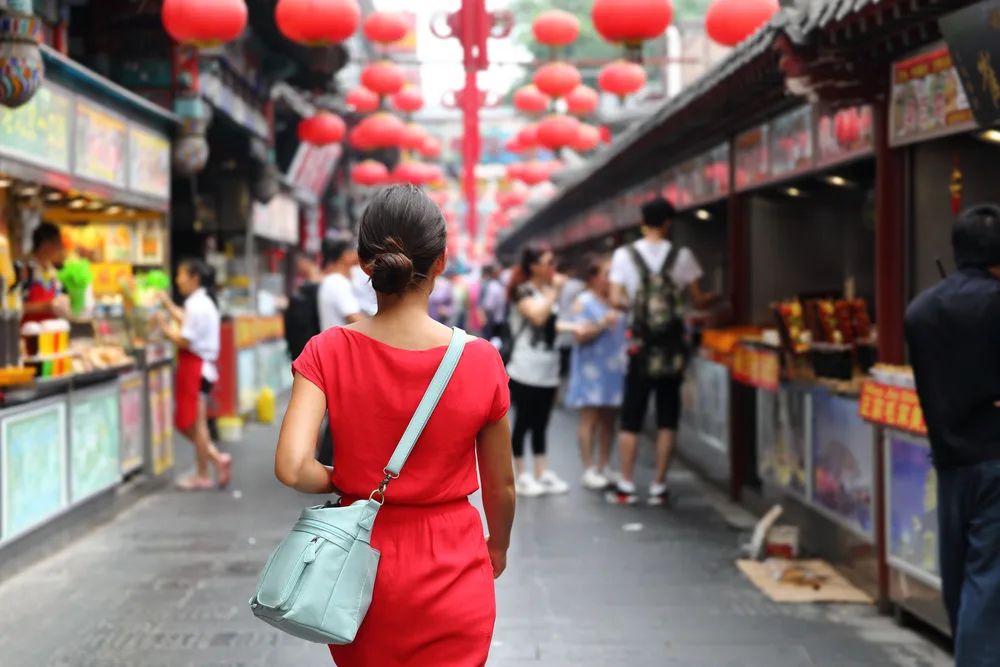
Maridav/Shutterstock
Here are some other questions you might want to know before visiting China:
Is it safe to walk around China?
For the most part, it is safe to walk around China and a great way to explore the cities. However, you will have to look out for the traffic.
Is China safe for foreigners to live there?
In terms of personal crime, China is very safe for foreigners to live there because there is a low level of crime and a high level of security, with lots of police attention given to protecting foreigners. However, depending on their profession, some foreigners, such as journalists and researchers, might be targeted for their work.
Where is the safest place to visit in China?
The safest place to visit in China is probably Shanghai, which has a very low crime rate, followed by Chengdu. However, all of China’s major cities are very safe.
Is China safe to travel to alone?
Yes, China is safe to travel to alone. Rates of violent crime are low, so you don’t need to worry about finding safety in numbers.
Is Beijing safe at night?
You may want to walk around China’s major cities, such as Beijing, at night. You still want to follow basic precautions such as sticking to well-lit, populated streets and only taking authorized taxis home.
So, Is China Safe to Visit?
China is probably one of the safest countries in the world to visit — as long as you don’t run afoul of the government. The crime rate is very low, and police are very responsive when addressing crime against foreigners.
While we personally wouldn’t visit this year, if you fall into the “adventurous” category, just know what you’re getting into before booking your trip. Safe travels!



